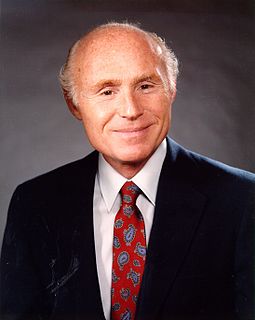A Quote by Deborah Rhode
I do think the whole question of judicial accountability is a complicated one. On the one hand, you want to encourage judicial independence. And it's always, I think, problematic when an unpopular decision triggers a recall election. Because it sends a disempowering message to judges. On the other hand, it's the only way that voters have to rein in someone whose views are really so out of the mainstream of public opinion that they jeopardize the legitimacy of the judicial process.
Quote Topics
Accountability
Always
Because
Complicated
Decision
Election
Encourage
Hand
Independence
Jeopardize
Judges
Judicial
Legitimacy
Mainstream
Message
Only
Opinion
Other
Out
Problematic
Process
Public
Public Opinion
Question
Really
Recall
Sends
Someone
Think
Triggers
Unpopular
Views
Voters
Want
Way
Whole
Whose
Related Quotes
You can understand why the original framers of judicial ethics thought it would be undignified and would call into question the legitimacy of the judicial decision-making process to have mudslinging by judges, but the way that we hobble people of enormous integrity from defending themselves is, I think, deeply problematic in states where you have an elected judiciary, or a judge is subject to recall.
On the one hand we want to preserve the integrity of the judicial branch, and we want to talk about judicial independence, and how damaging and dangerous it is when Donald Trump calls out Judge [Gonzalo] Curiel. And at the same time, at the end of the day, judges work for us and we can recall them and we can impeach them.
To be true to its constitutional role, the Supreme Court should refuse to be drawn into making public policy, and it should strike down legislation only when a clear constitutional violation exists. When judicial activists resort to various inventions and theories to impose their personal views on privacy and liberty, they jeopardize the legitimacy of the judiciary as an institution and undermine the role of the other branches of government.
I can only express the hope that faith in the judicial system will never be diminished, and I am sure it will not, so long as we allow a review of the judicial processes that takes place here in some other tribunal where obviously undue influence cannot be brought to bear. As long as governments are wise enough to leave alone the rights of appeal to some superior body outside Singapore, then there must be a higher degree of confidence in the integrity of our judicial process. This is most important.
Everyone knows that due process means judicial process, and when John Brennan brings him a list of people to be killed this particular week, that's not due process. That's certainly not judicial process. So there's the fifth amendment. Not even George Bush claimed the right to kill American citizens without due process.
If Americans loved judicial activism, liberals wouldn't be lying about what it is. Judicial activism means making up constitutional rights in order to strike down laws the justices don't like based on their personal preferences. It's not judicial activism to strike down laws because they violate the Constitution.
Much of the Constitution is remarkably simple and straightforward - certainly as compared to the convoluted reasoning of judges and law professors discussing what is called 'Constitutional law,' much of which has no basis in that document....The real question [for judicial nominees] is whether that nominee will follow the law or succumb to the lure of 'a living constitution,' 'evolving standards' and other lofty words meaning judicial power to reshape the law to suit their own personal preferences.
Some have argued that the President is required to get permission from a federal court before taking action against a United States citizen who is a senior operational leader of al Qaeda or associated forces. This is simply not accurate. 'Due process' and 'judicial process' are not one and the same, particularly when it comes to national security. The Constitution guarantees due process, not judicial process.






























